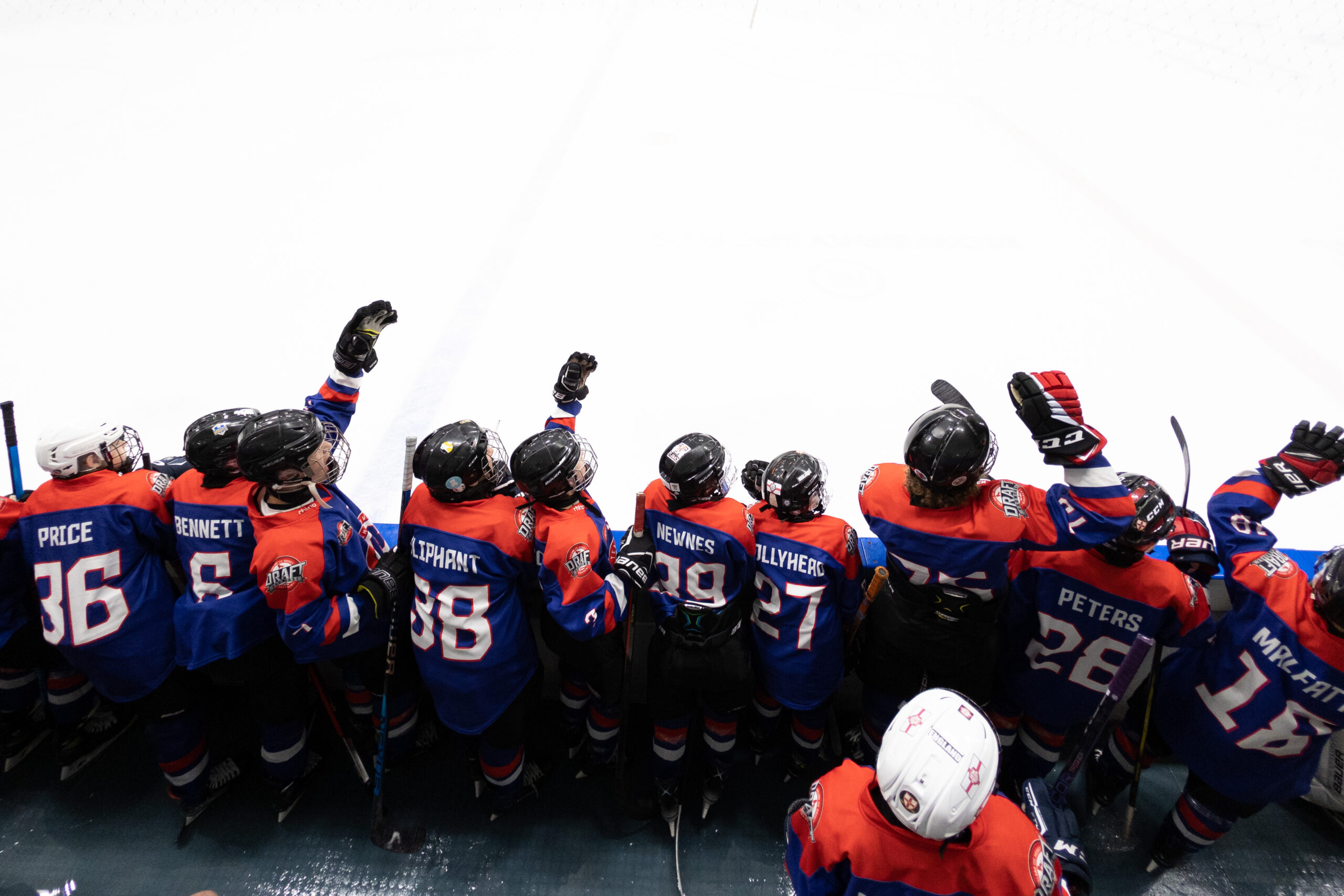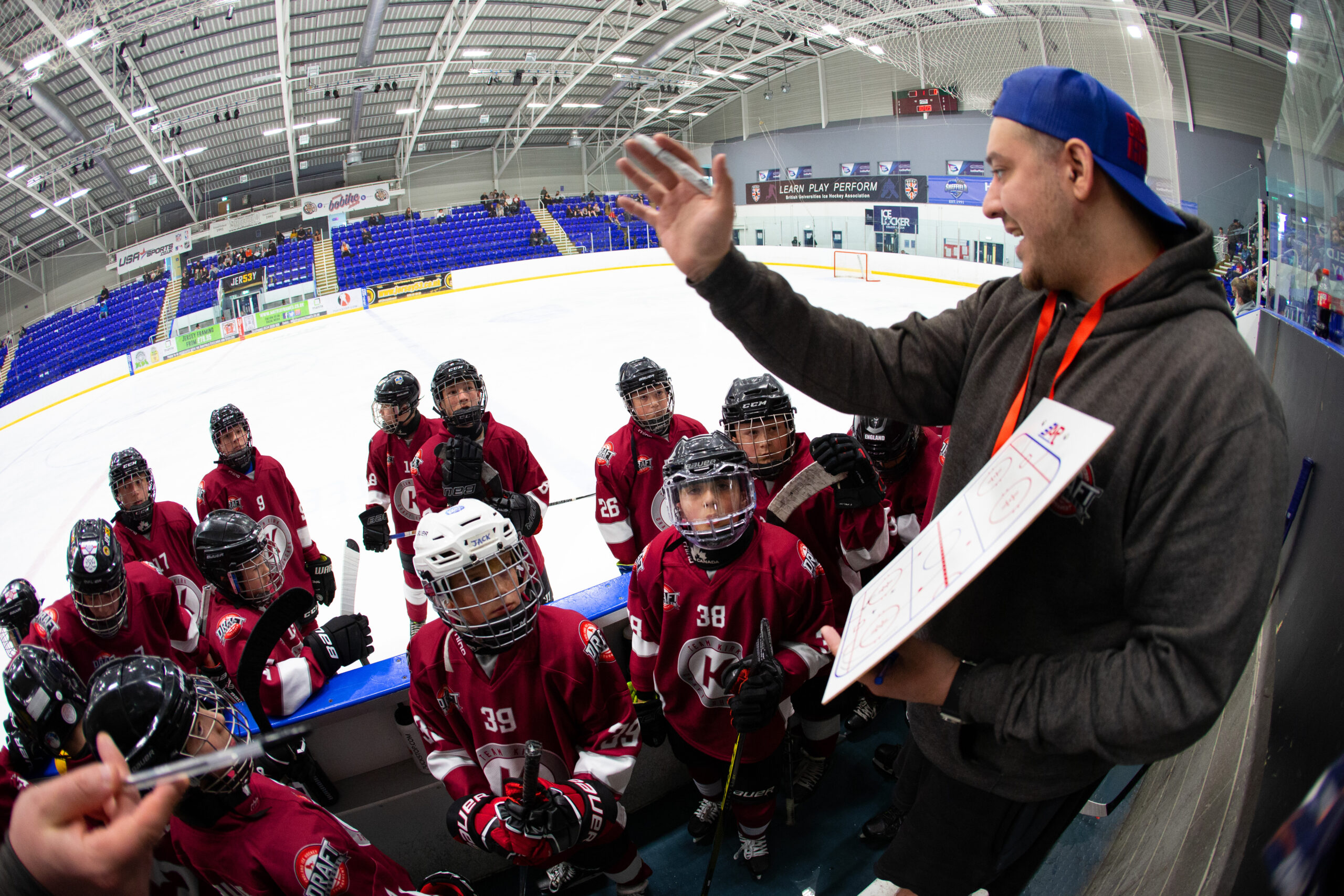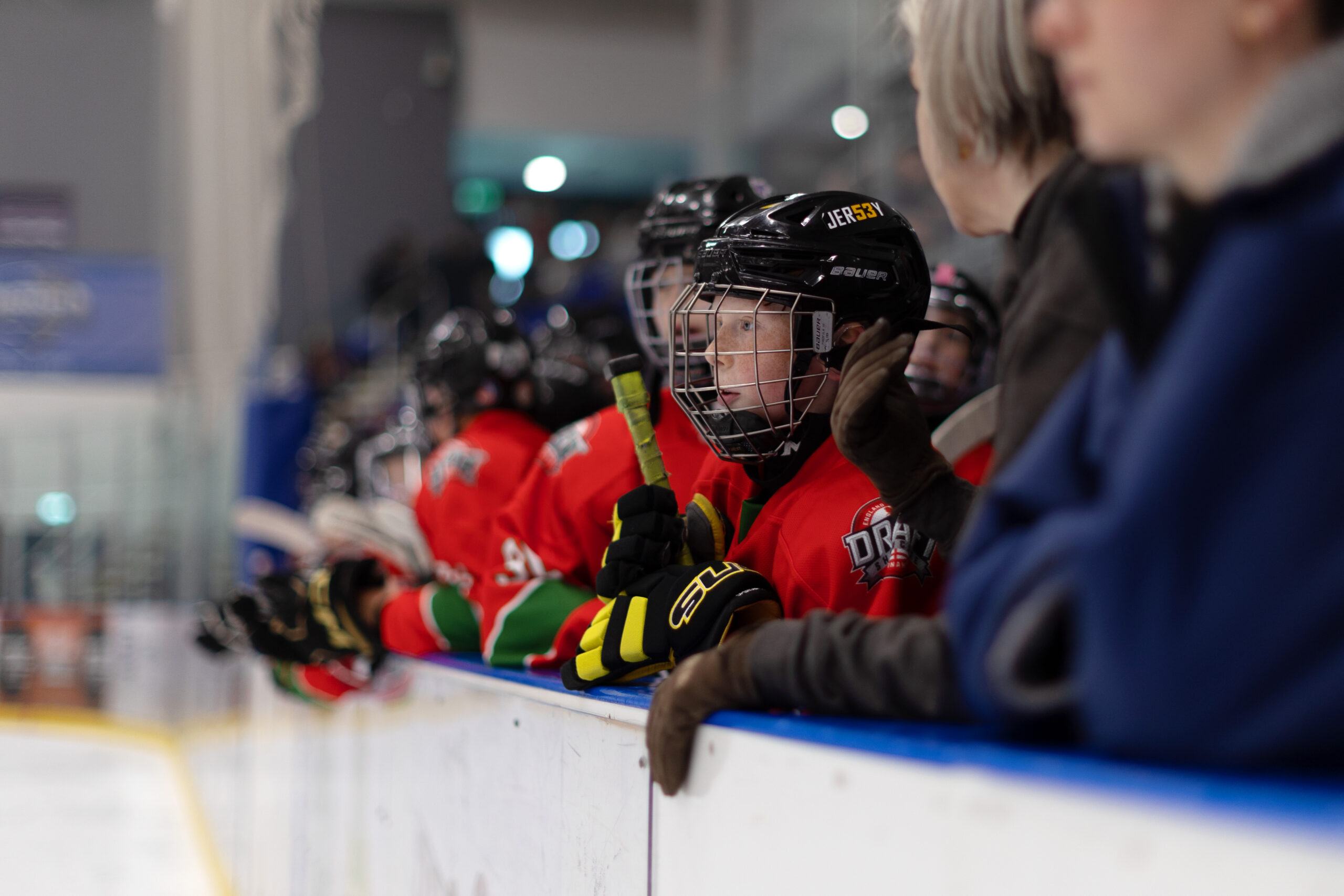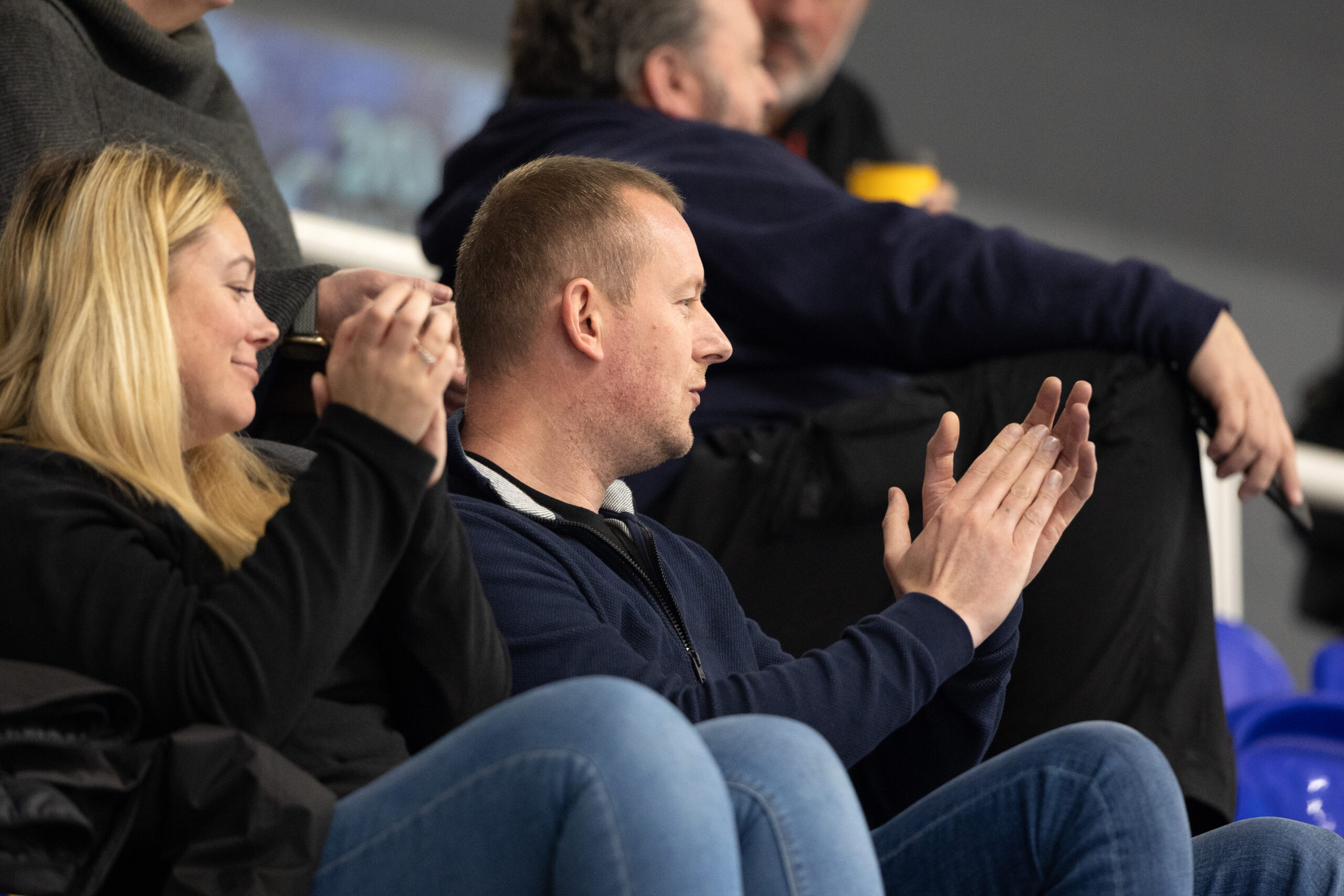As ice hockey’s governing body in England and Wales, safeguarding is a fundamental aspect of England Ice Hockey’s role, and of its affiliated members.
Collectively, we have an ongoing duty to ensure the game is a safe, positive and enjoyable experience for the millions of children, young people and adults who regularly play, watch, coach, referee and volunteer.
Safeguarding framework
Our approach to safeguarding across the sport is driven by a clear framework:
- Implementing preventative safeguarding measures;
- Providing ongoing education for everyone involved in the sport;
- Making the reporting of concerns as easy as possible;
- Embedding that safeguarding is everyone’s legal and moral responsibility;
- Ensuring every club has a trained Designated Safeguarding Lead (DSL) as a requirement of affiliation
This ongoing work is all underpinned by our policies, procedures and regulations which can be downloaded at the bottom of this page.

Legal and moral responsibility
We recognise that for safeguards to be effective across the game, we all need to understand the role we must play. Our national network of Designated Persons (individuals who have taken on a key role to drive safeguards within regional ice hockey, clubs and leagues) is fundamental to help provide access to and support with our policies, preventative measures and reporting processes.
We are all responsible for keeping people safe in our sport.
Safer recruitment and DBS checks
The intentions of most people who work with children in ice hockey are good. However, as part of England Ice Hockey’s commitment to provide safe and enjoyable environments, comprehensive recruitment and selection procedures are essential.
When clubs recruit new members, all reasonable steps must be taken to ensure unsuitable people are prevented from working with children.

As part of our safeguarding children strategy, England Ice Hockey requires those working in eligible roles with children and young people to complete an England Ice Hockey Enhanced DBS Check (with Children’s Barred List). This is in line with legislation and government guidance and is standard practice. England Ice Hockey do not accept a DBS checks from another organisation.
Where the DBS check highlights relevant information, this is investigated further and a risk assessment is carried out to establish whether or not they will be accepted to work with children and young people in ice hockey.
Activities that require a DBS Check (Eligibility)
All roles where a volunteer has regular close contact with U18s requires an enhance DBS check through England Ice Hockey. This includes those working at open age clubs that have participants aged under-18. These activities include managing, training, coaching and supervising as well as giving advice or guidance on wellbeing, caring for children or driving a vehicle solely for children on behalf of a club or organisation.
EIH enhanced DBS checks (with Children’s Barred List) must be completed via EIH’s Vibrant Nation service. If the person is not on the Update Service, the Disclosure must be dated 1st August 2023 or later.
The policy outlining the specific requirements for volunteers can be found on England Ice Hockey | Rules And Regulations
Eligibility is governed by legislation and government guidance. In brief this means a DBS check is required for anyone aged 16 years or over who undertakes any potentially unsupervised roles working directly with children and young people under the age of 18.
England Ice Hockey have partnered with Vibrant Nation and are delighted to be able to offer Coaches, Managers and other volunteers DBS checks free of charge. DBS checks are completed online. You are not licenced or insured by England Ice Hockey until your DBS check has been completed and verified by England Ice Hockey.
If you are a Coach, Manager or Off-Ice Official, contact your Club Designated Safeguarding Lead to start the DBS process. If you are new Club DSL, please contact the National DBS Lead to start the DBS process via safeguarding@englandicehockey.com
Safeguarding education
Our safeguarding education is delivered through a mix of online learning and in-person workshops.
In addition, in-depth contextual safeguarding is delivered to Designated Safeguarding Leads and an annual DSL Conference, with a shorter workshop provided at annual Manager training sessions.
Safeguarding: children and young people
A child is someone who has not yet reached their 18th birthday. Once they turn 18, they are legally an adult.
England Ice Hockey and its Clubs should always ask parents/carers if it’s ok for their children to get involved in an ice hockey activity.
16-17 year olds will usually be asked to make their own decision about getting involved (self-consent). In some exceptional circumstances parents/carers may also be asked.
Children have the right:
- To feel safe both online and offline;
- To healthy relationships and appropriate boundaries;
- Not to be bullied, harassed or intimidated;
- Not to feel uncomfortable or unsafe;
- Not to be discriminated against because of your age, gender, gender reassignment, ethnicity, sexual orientation, marital status or civil partnership, faith, ability or disability, pregnancy and maternity.
The UK signed the United Nations Convention on the Rights of the Child in 1990. The Convention sets out the rights of every child in the world to: survive, grow, participate and fulfil their potential. It sets standards for education, healthcare, social services and penal laws. It also establishes the right of children to have a say in decisions that affect them.

At England Ice Hockey our approach to safeguarding – and our responsibility to keep children safe – applies to the online environment as much as to the offline world.
We know that teams, clubs, and leagues really benefit from online and digital technology. Whether communicating team results or a change of venue, promoting social events, or sharing coaching tips and skills to encourage and support new volunteers – it helps teams and clubs to run effectively and be better connected.
For clubs to benefit safely from the online environment, it is important they follow best practice in social media and technology use. Club officials, match officials and parents/carers involved in football should understand how their safeguarding responsibilities apply online.
We’ve shared key England Ice Hockey guidance on this below for clubs, players and parents/carers – as well as signposting to other useful sources of information on all aspects of digital safety and wellbeing. We will continue to share advice and good practice on online safety in our training, guidance and communications.
Advice for parents and carers

We understand and value that parents and carers play a crucial role in safeguarding children in sport.
We are encourage parents and carers to follow the guidance below to help keep children safe in ice hockey:
- Ensure you know who your child’s coach/manager is, how they will communicate with you, how you can contact them and how to get feedback on your child.
- Ask if they are England Ice Hockey DBS checked and safeguarding trained.
- Put the NSPCC Helpline and Club Designated Safeguarding Lead name and contact details in your phone/notebook.
- Ensure you and your child understand the DSL’s role and know who they are.
- Be clear about acceptable and unacceptable behaviour at your child’s club – sign up and adhere to their codes of conduct and the England Ice Hockey Code of Conduct & Ethics.
- Ask your child what they enjoy about playing and remember this when supporting them!
- Agree with your child how you will support/check-in to see how they are doing.
- Ensure your child understands their rights.
- Ensure you and your child know how to report a concern.
- Encourage your child to speak to you about anything that worries them, no matter how big or small.
- Report any concerns to your DSL, no matter how big or small, and understand that this will not impact your role or your child’s position within the Club or England Ice Hockey.
Safeguarding resources
Safeguarding policies
The following policies are applicable to all affiliated EIH clubs.
EIH Safeguarding Children in Sport Policy
EIH Anti Bullying Juniors Policy
EIH Transport and Supervision of Children Policy
EIH Filming, Photography & Live Streaming Policy
EIH Pregnancy and Postpartum Policy
EIH Safeguarding Education and DBS Policy
Templates and forms
Please use the following templates and forms to aid safeguarding at your club.
EIH Safeguarding Pre-Season Checklist for Clubs
EIH DBS Risk Assessment Template
EIH Changing Room Consent Form
EIH Photography and Filming Consent Form Template
EIH Live Stream Broadcasting Consent Template
EIH Junior Playing Up Consent Form Template
If you have a concern about a child who is at significant risk of harm or immediate danger, call the local Authority Children’s Safeguarding Board who have a 24-hour helpline and/or 999.
Please remember that the person taking the disclosure has the legal and moral responsibility to make the direct referral directly to Children’s Services. They can be supported by the Club Designated Safeguarding Lead (DSL) and England Ice Hockey to do this.
If you have a concern about a vulnerable adult who is at significant risk of harm or immediate danger, call 999.
If the concern is about an adult working with children or vulnerable adult, you should report this to the Local Authority Designated Officer (LADO).
For all of the above, when it safe and appropriate to do so, we ask that you complete England Ice Hockey Safeguarding Incident Form
If the matter is not immediate or high risk, or is an example of poor safeguarding practice, you can report your concerns in one of the following ways:
- Contacting your Club’s Designated Safeguarding Lead (recommended first course of action)
- Contacting your Regional Designated Safeguarding Lead
- Emailing our Safeguarding Team: safeguarding@englandicehockey.com
- Completing our England Ice Hockey Complaints and Concerns Form (poor practice only): Report Complaints & Concerns
England Ice Hockey are here to support all members who report incidents. If you are unsure of something, report it!
Please remember, safeguarding concerns are sensitive and confidential. They should be raised within your Club and/or England Ice Hockey, but must only discussed with those immediately involved in the child’s welfare. This must include someone that has received England Ice Hockey safeguarding training and is likely to be the Club Designated Safeguarding Lead, Team Manager and Team Coach. It is not generally appropriate to disclose this information to the wider Club Committee, unless they are involved in the child’s immediate welfare.
What will happen with your report?
England Ice Hockey will work with the appropriate people and any statutory agency in order to manage or address the concern. All safeguarding concerns are treated with confidentiality and information is only shared on a need-to-know basis.
Childline is available to help anyone under 19 in the UK with any issue they’re going through. You can talk about anything. Whether it’s something big or small, their trained counsellors are here to support you. Childline is free, confidential and available any time, day or night. Call 0800 1111
NSPCC’s online safety hub: Visit NSPCC’s Online Safety Hub for advice and information on a range of different online safety topics including gaming, social media, sharing nudes and parental controls. They also have resources and tips to help you start a conversation with your child about online safety, and links to support if you have any concerns.
Keeping children safe online blog: Parents/carers and professionals can keep up to date with the latest child safety online news on Keeping Children Safe Online blog.
For the Helpline call 0800 800 5000.
A charity offering information for parents/carers including a parent/carers’ guide to online gaming, how to report concerns and the five things’ teenagers want parents/carers to know. It also offers topics aimed at primary and secondary school children, that are age-appropriate and provides clear definitions, tips and advice.
The National Crime Agency’s CEOP Education team (NCA-CEOP) aims to protect children and young people from the threat of online child sexual abuse. They do this through the CEOP Education programme which provides training, resources and information for young people, their families and professionals who work with them.
The CEOP Education programme aims to:
- Increase professionals knowledge of online child sexual abuse and how to respond to it – through education and safeguarding.
- Increase children’s knowledge, skills and resilience, making them safer online and ensuring they know how to seek help when they need it.
- Give parents and carers the knowledge and skills to help their children be safer online and know how to seek help when they need it.
As well as offering general support for Lesbian, Gay, Bisexual and Trans (LGBT) young people, Young Stonewall offers specific guidance on managing online issues such as cyberbullying.
Papyrus UK is a charity for the prevention of young suicide (under 35) in the UK. Call on 0800 068 4141 24/7 for support.
Samaritans is a registered charity aimed at providing emotional support to anyone in emotional distress, struggling to cope or at risk of suicide.
This charity offers a wide range of advice and guidance on all aspects of internet safety to parents.
A charity promoting children’s safety and security online, SWGfL offers a range of tools and resources for schools and professionals and hosts a helpline for professionals on online safety issues.
YoungMinds are a mental health charity for children, young people and their parents, making sure all young people can get the mental health support they need.
Free information and support for under 25s in the UK. Get advice about relationships, drugs, mental health, money & jobs.